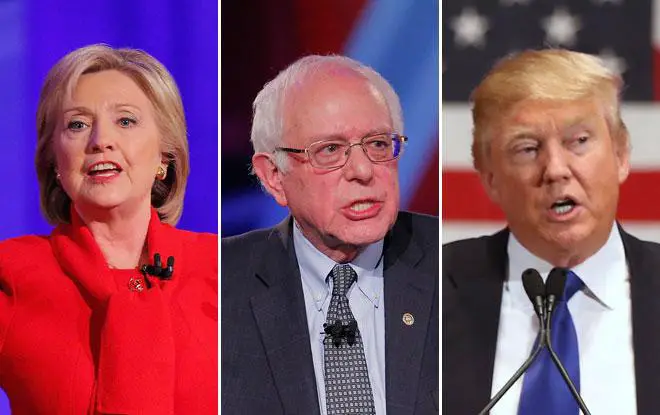In the primary season, some people focus on issues, others concentrate on winning in November. Does it matter that you agree with Bernie Sanders? What good will that do if he’s going to lose to Donald Trump, anyway?? Well, look at the polls.
A famous pollster says Bernie’s right—that he is more “electable” than Hillary Clinton.
Renowned pollster J. Ann Selzer said Bernie Sanders “makes a very fair point” when he says he would do better in a general election against Donald Trump than Hillary Clinton. . .
“I think he makes a very fair point, which is that in these polls, our polls have shown it as well, that when you do a head-to-head with Hillary Clinton versus the field or Bernie Sanders versus the field, Bernie Sanders’ numbers are uniformly higher than Hillary Clinton,” Selzer said. “It certainly tells us that this is an electorate that is in a mood for a change.”
There are numbers to back up that opinion.
Senator Bernie Sanders would defeat Donald Trump relatively easily in a general election, according to the latest polls. An average of the three most recent major polls predicts a victory of more than 14 points, which would be a landslide in modern presidential politics.
CNN/ORC, May 1: Sanders obliterates Trump by 16 points
IBD/TIPP, April 28: Sanders defeats Trump by 12 points
USA Today/Suffolk, April 24: Sanders defeats Trump by 15 points
Hillary Clinton fans often say Bernie is too liberal. In one interview, Hillary, herself, hinted that Bernie is better on the issues—but only in the primaries. However, the Observer says that the argument that Bernie is “too liberal” no longer works.
The reason to bet on Mr. Sanders being competitive in the general election has to do with a force beyond his control: the remarkable polarization of the electorate. More voters than ever despise the other party rather than embrace their own, a phenomenon known as “negative polarization,” and this means there are relatively few voters left who will be genuinely undecided between the Democratic and Republican candidates.
“The rise of negative partisanship means that very few Republicans or independents who lean toward the Republican Party will vote for Hillary Clinton or any other Democratic presidential candidate in 2016,” wrote Alan Abramowitz and Steven Webster, two political scientists at Emory University, last July. “Likewise, very few Democrats or independents who lean toward the Democratic Party will vote for … any of the other potential Republican candidates.”
Strongly partisan voting patterns will mean the likelihood of a very close election this fall, regardless of which candidates the parties nominate. Compared to presidential elections of decades’ past, there are a limited number of states that will actually be competitive for either party. In the 2000 election, 12 were decided by five points or less; that number shrunk to four in 2012. There is still little reason to think that the 2016 election won’t come down to the same few swing states.
Does “likable” mean the same as “electable?”
He has been rapidly climbing in the national polls while Hillary Clinton has been declining; from double digits down, Bernie is now tied or ahead by as many as five points. From a historical perspective, his favorability ratings dwarf Hillary’s in a way that makes her chances of winning a national election highly unlikely and his chances highly likely. The polls also show Bernie is the more electable candidate in a race against any of the likely Republican nominees. Among independents.. .Sanders is the clear winner. Sanders has maintained a double digit lead over Trump for months…
Bernie is the one national candidate who people like the more they get to know him. As people learn more about Clinton, Trump, and Cruz, they like them less. As the country learns more about Bernie, they like him more. He’s still relatively unknown compared to Clinton and Trump, yet he already outpolls them. Looking at the current trends, one would predict that Bernie Sanders will be the most popular politician in the country come November, just as he is now.
But before you bet the farm on seeing Bernie in the White House, consider one caveat. Hillary has purposely done little negative advertising, since she’ll need Bernie fans to get elected. So on the one hand, you hear praise of Bernie’s “outsider” campaign—including from Donald Trump. On the other, there is little criticism.
It’s true that Sanders does better than Clinton in hypothetical matchups against the Republicans. Currently, Sanders outperforms Clinton by more than seven percentage points against Trump. . .But that’s not because Sanders is the stronger nominee. It’s because Republicans haven’t yet trashed him the way they’ve trashed Clinton. Once they do, his advantage over her would disappear.
The problem with current polls that test Sanders against Trump. . .is that they don’t capture the effects of the fall campaign. As Harry Enten points out in FiveThirtyEight, early general-election polls in previous cycles were predictively worthless. Early in the 2000 election, for instance, George W. Bush led Al Gore by 12 percentage points. “Bush, then the Texas governor, burst onto the national scene with relatively little negative media scrutiny,” Enten observes. Between December 1999 and November 2000, as the scrutiny intensified, Bush’s net favorability fell 27 percentage points. He ended up losing the popular vote.
The fact is, today’s polls will mean nothing in a few months. But in the meantime, they give Bernie fans a reason to get up in the morning.
